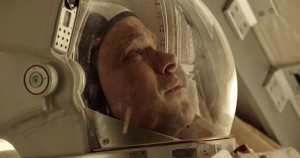The Martian
-from contributing editor, Andy Ray
 Following Christopher Nolan’s overblown, overwrought, overbudgeted 2014 disaster Interstellar, I was decidedly unenthused about seeing Ridley Scott’s new sci-fi flick The Martian. Let’s say I was pleasantly surprised. I’m not ready to put The Martian in the same class as Scott’s 1979 classic Alien, but it’s his best effort in years.
Following Christopher Nolan’s overblown, overwrought, overbudgeted 2014 disaster Interstellar, I was decidedly unenthused about seeing Ridley Scott’s new sci-fi flick The Martian. Let’s say I was pleasantly surprised. I’m not ready to put The Martian in the same class as Scott’s 1979 classic Alien, but it’s his best effort in years.
Matt Damon (who, ironically, appeared in Interstellar last year) plays astronaut Mark Watney, left for dead by his crew on the surface of Mars following a severe Martian storm. In the first of several mental leaps we’re asked to make, Watney turns out to still be alive, but faces the fact that he will probably die. He doesn’t have enough food rations to survive the length of time it would take NASA to launch a rescue mission, nor does he have any way of communicating with NASA to inform them of his status as a living and breathing human being.
But this is a big-budget Hollywood production, and Matt Damon will be rescued and returned safely to earth. Won’t he? If we assume the premise that he will live (as I did), The Martian still provides a thrill ride of over two hours. How will he do it? How will he make it to safety? In a way, I was reminded of Ron Howard’s masterful 1995 film Apollo 13. We all knew how the story would end, but the joy was in finding out how the astronauts would make it to safety. While The Martian is obviously not a true story, the nuts and bolts of Mark Watney’s survival is the stuff of classic cinema.
Being a botanist, Watney uses his own feces to fertilize potatoes, which he grows and eats along with the food rations left behind during the crew’s escape. Even more fascinating is how Watney begins communicating with NASA. I can’t give it away, but suffice to say that it is a work of genius. Also compelling is a discovery by a low-level NASA astronomer and expert mathematician (Donald Glover) that the returning crew can use the earth’s atmosphere as thrust to travel back to Mars and pick up their abandoned friend. It’s essentially the role Gary Sinese played in Apollo 13 – the guy on the ground who solves the problem in the air. If your teenagers have shown any interest or skill in math and science, take them to see The Martian. Technology experts haven’t been this celebrated in film in a long time.
As usual, Matt Damon gives an expert performance, but unlike Tom Hanks and crew in Apollo 13, I never got the sense that Damon’s character believed he was in any grave danger. Granted, in a situation like this it would certainly help to be confident and even a tad egotistical. But Damon’s Mark Watney treats his four-year Martian isolation as simply the next solvable problem facing him.
The actors playing the NASA team are strong, particularly Jeff Daniels as the NASA director, forced to walk a fine line between utilizing scarce funds for a doomed rescue mission versus telling the media and the public what they want to know. Chiwetel Ejiofor (12 Years A Slave) is also solid as the Mars mission director. Amongst the crew members, Jessica Chastain is notably effective as the mission commander, forced to take control of several dicey situations while harboring personal guilt for making the decision to abandon Watney for dead in the first place. I also like Kate Mara (sister of Rooney) as the system operator and on-board technician. Again, hats off to those capable in the STEM disciplines. This film celebrates your abilities.
I’ve heard and read many comparisons of The Martian to Robert Zemeckis’ 2000 adventure drama Cast Away. But unlike that picture, others soon know Astronaut Watney is alive and alone on Mars. Therefore, about half the action takes place on earth – at NASA headquarters, and in Washington. Cast Away was more a one-man show. Furthermore, the Tom Hanks character in Cast Away was driven mad by his isolation. In The Martian, Matt Damon’s character never loses mental control. I found this unrealistic, and it is my greatest criticism of an otherwise great motion picture experience. Every other aspect of Drew Goddard’s screenplay struck me as realistic.
The Martian will undoubtedly be one of the big hit films this fall. And deservedly so. If I were to rank recent “serious” science fiction genre offerings, I would put Alfonso Cuaron’s Gravity is the best. The Martian is a close second. And I hope I never have to sit through Interstellar again.
This Andy Ray review also appears on website TheFilmYap.com.